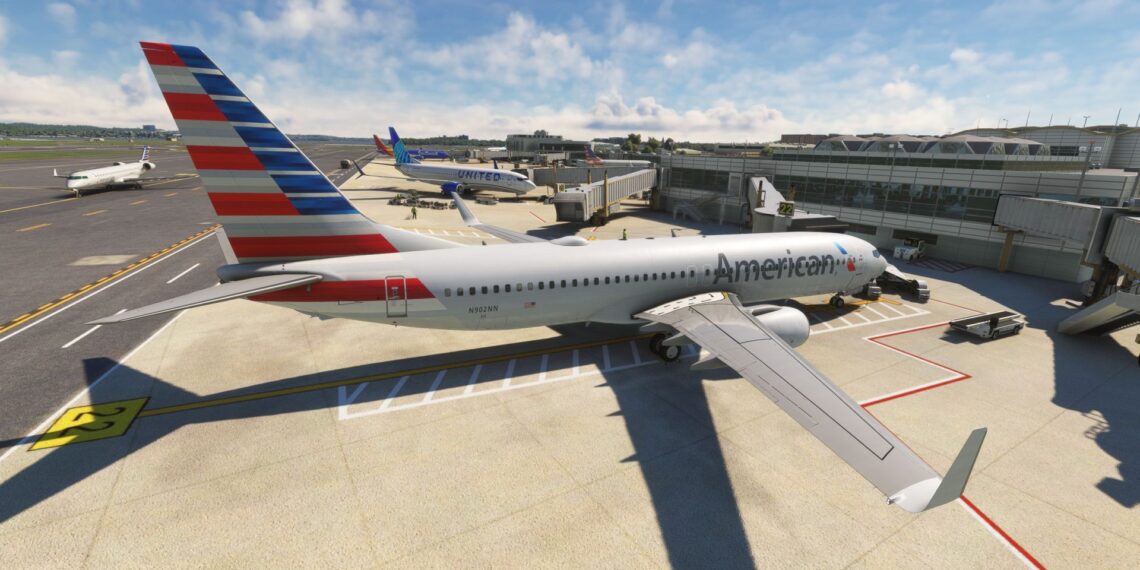The question “Is this a game or a simulator” is as old as the availability of simulation games on commercial entertainment platforms, be it PCs or consoles.
It’s also a debate that often becomes pretty heated for a variety of reasons: mainly, many enjoy the idea that their favorite hobby isn’t “just a game” but something more serious and involved that puts them above the “average gamer.”
It has recently resurfaced with the force of a thousand suns after the release of Microsoft Flight Simulator, which is absolutely a full-fledged simulator, but is also available on consoles (which some see as a purely gaming-oriented kind of platform) and includes accessibility and quality-of-life features that make it welcoming to all manners of gamers.
The “this is just a game, not a simulator” argument reaches its maximum levels of virulence when made by those who criticize Microsoft’s latest endeavor into flight simulation, whether because they don’t like some of its aspects or they simply seek to elevate competing products in comparison.
To address this kind of discourse, and all discourses that question whether software is a game or a simulator, we need to look at whether the two definitions are actually in conflict.

Both definitions are really broad, but in general, a game is an activity with rules, often (but not always) performed for entertainment. A simulator is a recreation of specific conditions, situations, or machinery that operates outside of these conditions.
These definitions are not in conflict at all, as a game, whether it is used for pure entertainment or not, can definitely aim to recreate the functioning of a vehicle or a specific activity.
Simulators also don’t need to always be the pinnacle of realism, simply because “realistic” is a very vague definition the meaning of which varies depending on who you ask.
Drawing the line between two pieces of software that reproduce reality to a degree, dividing which one is a simulator and which one isn’t, can only be absolutely arbitrary.
Let’s take iRacing and Forza Motorsport (or Gran Turismo) as examples.
iRacing is seen by many as the pinnacle of racing simulation on PC. It includes advanced physics across the board and a ruleset designed to bring online racing quite close to real racing, so much so that it draws professional racers, and many of its racers are considered professionals even if they have never raced in a real car.

Forza Motorsports and Gran Turismo are perhaps less complex than iRacing and are born on consoles (albeit Forza is now also on PC and I wouldn’t be surprised if Gran Turismo made the jump soon as well), but they still come with advanced physics simulation and host a lively eSports environments.
The superficial approach would be to define Forza Motorsports and Gran Turismo as “games” and iRacing as a “simulator,” but that would be fallacious (like most superficial approaches).
There is no real absolute way to draw the line between them to exclude any from the definitions of simulators or games. Both Forza and GT make a very deliberate and extensive effort to simulate reality and any bar set above what they achieve could only be arbitrary.
Quite simply, where do we draw the line?
Conversely, we can’t really say that iRacing isn’t a video game. It fulfills all requirements to be defined as such. It runs on commercial hardware that can be purchased by anyone and the vast majority of its users enjoy it as a form of entertainment.
“Realism” is such a vague factor that there is simply no way to see it as an absolute distinction between this or that software.

Perhaps some would be surprised to know that even professional Level-D flight simulators that cost millions of dollars involve a considerable level of approximation compared to reality, and they don’t always come on top of “entertainment” flight simulators in every aspect of realism.
Looking at the opposite side, can we absolutely say that a series like Ace Combat is not a simulation? Not really. Despite the fact that its flight model and its features certainly place it a lot farther to reality compared to most traditional military “flight simulators” like DCS World, it still simulates several aspects of the operation of a real jet fighter and flight in general.
Of course, we can argue that said aspects are not sufficient to define it as a “flight simulator,” but that argument remains arbitrary and based primarily on a perceived consensus that doesn’t really exist.
Of course, looking at Microsoft Flight Simulator, which focuses much more actively on reproducing realistic conditions, procedures, and instruments, it’s even more difficult to prove that “it’s a game, not a simulator” as the goalposts need to be moved to extreme positions to support that argument.
Those who take that stance usually base it on the perceived existence of a “more realistic” flight simulator, which is quite arbitrary. Competing products may be superior in some aspects of flight simulation, but they are inferior in others (and said superiority and inferiority are arguable to begin with). Who decides which one of these aspects is more relevant?
Another argument brought in favor of defining Microsoft Flight Simulator as “just a game” is its graphics, like visual fidelity was somehow in conflict with simulation fidelity. I’m often surprised that this needs to be explained, but visual fidelity enhances immersion, and immersion is absolutely a relevant factor in a simulation that aims to reproduce reality.

On top of that, visual fidelity is a crucial element in simulating VFR flight (which involves navigation following visible and recognizable landmarks in the environment), and we can’t say that simulating VFR flight better than any other commercially available flight simulator is a negligible factor.
Lastly, some argue that Microsoft Flight Simulator is less of a simulator because of its focus on accessibility and availability on Xbox, which is seen exclusively as a “gaming” platform.
This is a perplexing stance. Nowhere in the definition of a simulator, do we find exclusivism or lack of accessibility to a wide audience.
The platform is also irrelevant. Nowadays an Xbox is nothing more than a pre-packaged PC with no hardware customization, but it’s no less capable of running a simulation or complex games in general.
As a matter of fact, on Xbox, you’ll find software that rivals or even surpasses the complexity of most simulators. Paradox Interactive’s strategy games like Crusader Kings 3 are a good example. They’re extremely complex, and yes, strategy games are also simulators by definition.
As an interesting note of color, in Japan, the definition of “simulation games” is much wider than what is commonly used in the West, and it formally includes strategy games.

Seeing consoles as a platform for “games” and “gamers” only, that can’t support simulators, is simply factually incorrect, just as it’s incorrect to see “gamers” who play on consoles as an unviable audience for simulators.
There is, of course, a degree of elitism in the argument that wants to exclude “gamers” from the viable audience of simulators, mostly derived from how insular certain simulation genres have become due to years without broadly accessible AAA-level simulators capable of being successful on the mass market.
Flight Simulation is one of these genres. Once upon a time, pretty much until Microsoft Flight Simulator 2004: A Century of Flight, many flight simulators were seen as cutting-edge AAA games with plenty of mass appeal, and you saw them on the cover of popular gaming magazines.
As a matter of fact, MSFS 2002 was my first professionally written (and paid) review when I used to work on print media many moons ago, and yes, it was featured on the cover of the magazine.
The withdrawal of the only really big player (Microsoft) from the market after Microsoft Flight Simulator X, removed the genre from the triple-A space, and other developers seemed all too happy to appeal to a small niche.
As it often happens when a niche becomes small and insular, elitism is born, as many are driven to believe that the reason why a wider audience isn’t interested in their hobby is due to shortcomings of that audience itself, as opposed to shortcomings in the hobby, or how it’s marketed and made accessible. Besides, everyone loves to feel superior to the “common folks.”

The arrival of Microsoft Flight Simulator in 2020 completely shattered that status quo. For the first time in a decade, a flight simulator was designed both with simulation precision and mass appeal and accessibility in mind. This resulted in millions of people touching the flight simulation hobby again.
While many welcomed the arrival of new blood in the hobby, others saw it as a threat to their “elite” status. This is the primary factor that gave birth to the “it’s a game, not a simulator” argument.
Can we say that all games are simulators? Yes and no. We can easily say that most games are simulations, or at least involve relevant layers of simulation.
For instance, the popular Monster Hunter World and the upcoming Monster Hunter Wilds include a deep ecosystem simulation that works as a relevant enhancing factor to their immersion. Can we call them hunting simulators? Probably not.
On the other hand, the developers of games like Forza Motorsports or Gran Turismo dedicate a lot of their resources to simulating automotive racing, so they can both be defined as simulators. Are they super-advanced, ultra-realistic simulators? Arguably not, but they’re simulators nonetheless.
Conversely, are simulators also games? We can certainly answer “yes” when they are commercially sold and used as entertainment. Microsoft Flight Simulator, X-Plane, iRacing, DCS World, and many advanced simulators are absolutely enjoyed for entertainment by the vast majority of their users. So yes, they are also games.

Admittedly, we have heard the line “This is a simulator, not a game” uttered by the developers of Microsoft Flight Simulator themselves quite a few times, but this is an understandable attempt to appease the simulation crowd in very specific simulation-dedicated environments. Facts speak louder than words, and it’s obvious that Microsoft fully intends to be inclusive toward the gaming crowd as well.
What about the use of simulators for training? Does that pull them out of the definition of games? It really doesn’t. Games in general and video games in particular are often used for professional training purposes by many completely serious companies and institutions.
You only have to google “use of gaming in professional training” to find hundreds of articles on general and specific cases, and even plenty of academic papers.
Ultimately, as mentioned above, there is no real conflict between the Simulators and Games. Simulators that you can purchase and run at home on your computer (or simulation rig) can absolutely be defined as games, and games that aim to reproduce a real situation can absolutely be defined as simulators.
The fact that the simulator you use as a training tool is also a game does not detract from the seriousness of your training, and we really don’t need to be ashamed to admit to our family and significant others that our hobby involves a healthy dose of entertainment.
In case you’ve missed it, you can enjoy yesterday’s roundup with more flight simulation news.
If you’re new to flight simulation and you’re interested in trying the hobby out, you can find help in our starting guide, alongside our second article on how to download and install add-ons in Microsoft Flight Simulator.












